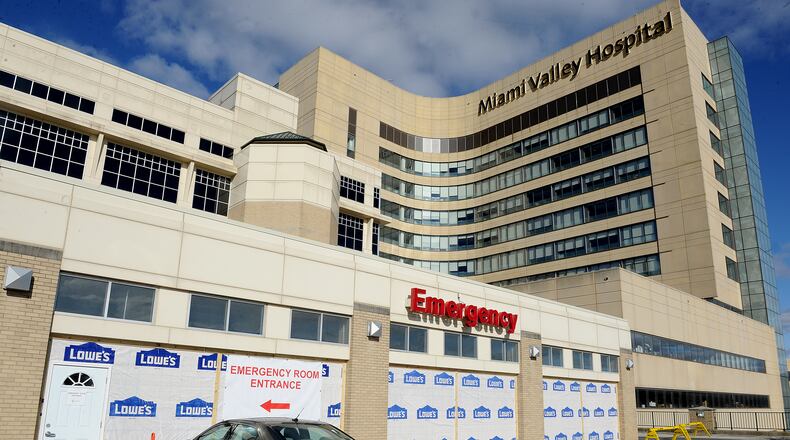“I was devastated,” said the 39-year-old. “I had a good cry, a couple screaming and crying fits. I waited so long for that release to come … This is not my nose job got canceled. This is surgery that’s been warranted for months, but there were all these different struggles trying to get things approved and at the very last minute, they canceled it.”
The record number of coronavirus patients crushing area hospitals has consequences for everyone’s health care. Earlier this month, the region’s largest hospital networks — Premier Health, Kettering Health and Mercy Health — postponed nonemergency, elective surgeries that require an overnight stay.
On Jan. 19, 565 patients were hospitalized with COVID-19 at Premier Health and Kettering Health hospitals, including 105 patients in the intensive care unit. Nearly nine out of 10 patients hospitalized for COVID-19 in the Dayton region are unvaccinated, according to GDAHA.
Thursday, nearly 79% of the beds in all the hospitals in our area were occupied. Nearly 79% of all ICU beds also were in use.
When Premier Health announced its new policy, a spokesman said the move was “to help preserve critical hospital capacity for our patients and the community.”
Greater Dayton Area Hospital Association President Sarah Hackenbracht said at the time that the hospitals are ringing the alarm bells and our region is in a dangerous place as it relates to the pandemic’s impact on normal medical care.
This triaging of medical care has left an unknown number of residents waiting on procedures that are not immediately critical but could prevent future complications, reduce their severe pain or better their quality of life. Besides surgeries, some residents are reporting long wait times at emergency rooms and urgent cares, and others are having trouble getting doctors’ appointments.
“It’s disturbing that we’re starting yet another year of delaying necessary processes and procedures to keep us healthy,” said Dr. Gary LeRoy, associate dean at the Wright State University Boonshoft School of Medicine and former president of the American Academy of Family Physicians. “You don’t want to wait until the car breaks down to start paying attention to it.”
Nearly two years of the pandemic postponing routine care has a domino effect for health outcomes, LeRoy said.
Waiting in pain
Sarah Edwards, a 39-year-old Bellbrook resident, was also supposed to have a hysterectomy in early January but her procedure at Miami Valley Hospital was canceled the day before it was scheduled.
Edwards began having issues with painful menstruation in 2019. Over time, the pain got worse and now she is in pain almost daily.
“You can only do so much with medicine,” she said.
When she got the call that her surgery was canceled, Edwards cried for hours out of frustration.
“Now I have to deal with the pain and the emotional toll everything has already taken on me while also having to lose out on more money since my husband lost out on pay for taking off the original days and now having to take off again for the new date,” Edwards said. “I totally understand the need for the hospital to make that call, but physically and mentally it’s been a struggle.”
Hackenbracht said decisions to delay procedures have not been made lightly.
“We certainly empathize with every single person in our community who is in this position, and we truly ask for their patience and trust that things will start to return to a little bit more of a normal operation in the near future,” she said.
Frustration with the unvaccinated
In December, area resident Frank Gentner’s cardiologist could not get a hospital room to perform a procedure on his heart to treat his atrial fibrillation.
It’s not a critically urgent procedure. But Gentner is annoyed that his health care is impacted by people not getting vaccinated.
“I’m very irritated at the people that won’t get vaccinated and that’s causing this horrendous overuse of medical facilities for something that’s preventable,” he said.
When announcing that Premier Health would delay procedures, spokesman Ben Sutherly said, “if you have not already done so, please get vaccinated against COVID-19 and take other precautions (such as masking and social distancing) whenever possible to help us in caring for the community.”
We were just starting to catch up
Early on in the pandemic, in spring 2020, procedures, routine medical screenings and other care was postponed. Even more patients avoided routine health care visits due to fear of the coronavirus or circumstances resulting from the pandemic, like needing to care for a loved one, LeRoy said.
That left doctors and patients playing catch-up in the summer of 2021 when the pandemic abated somewhat and many people came back for care, he said.
“And then along comes Delta and Omicron,” LeRoy said. “I suspect we’ll spend a considerable part of 2022 digging back out of the hole that we’ve slipped back down into again with some of these preventive care measures.”
About the Author

